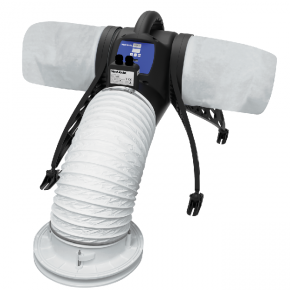
GUEST ARTICLE: Coronavirus crisis – a risk manager’s perspective
This guest article sees Jacqueline Hughes, senior risk analyst at risk management consultancy, Equib, talk about contingency planning currently underway on many projects and programmes due to the Coronavirus crisis and whether project managers have the specialist skills required to plan for the worst-case scenario?
“With fears about the spread of the Coronavirus mounting and Government advising everyone to stay at home unless their work is ‘essential’, contractors and project managers are increasingly concerned that enforced site closures could be imminent.
With contingency planning already in full swing on many projects and programmes, are the businesses involved in their delivery equipped to make the right decisions at the right time?
With Government advice changing on a daily basis and a high degree of uncertainty surrounding the crisis and how long it will last, the need for agile decision making across industry sectors has reached a level not seen since World War II.
In the past week, the Government has announced a £350bn Business Support Package designed to protect all businesses and individuals from financial hardship.
While construction companies large and small should make use of these business loans, grants and time to pay arrangements, they are also facing daily challenges in managing staff and other stakeholders and taking operational decisions.
For many large building projects and infrastructure programmes, the layers of businesses involved in delivery make it especially difficult to get an overview of the likelihood of staff or materials shortages, and which areas of the build could be most affected.
At the same time, advice from the Government in relation to social distancing is forcing some project managers to rethink whether planned work involving large numbers of workers, should go ahead or not.
In some cases, project managers are advising stakeholders that sites should be mothballed. In other scenarios however, programme changes can be made, which might alter the sequence of works, but allow work to continue in the short term.
While many construction businesses will have contingency plans in place for crisis situations, they may not be robust or accessible enough to be effective.
Clearly, few could have foreseen the extent of this type of crisis and pre-existent plans that are too complex, or based on very specific events, may not be much help.
Even with plans in place, the reality is that many contractors and project managers are now in ‘reactive planning’ mode, which basically means they are reacting to live events.
Even in reactive planning mode, some element of forward planning is necessary. For example, contractors and project managers should be considering what action they would take if a lockdown is imposed.
Would they need to lay off staff, if so, how many or will it be possible to keep working? At what point would they take the decision to close the site?
Critically, they should also be considering, how quickly they could restore operations after, say, a two-week closure? Armed with a clear understanding of potential threats to business continuity, decision makers will be better placed to take the right decisions at the right time.
When involved in reactive planning, it is important to consider all potential areas of threat, particularly focusing on the impact events.
As well as considering potential staff and materials shortages, businesses could face challenges in staying in touch with suppliers, customers and other partners, and delayed payments could lead to cash-flow difficulties. Some mitigating action can usually be taken to alleviate such pressures.
To assist them in dealing with a live and fast-moving situation, project managers and contractors should make sure they have the right procedures and processes in place.
Decision-making protocols need to be streamlined, so action can be taken quickly where needed. No scenario will play out in exactly the same way every time, therefore plans need to allow for this by providing the means to mitigate through key processes, while retaining the ability to change and adapt.
When considering processes, project managers and contractors should not overlook the importance of communication in responding to a crisis situation.
Most will have already issued some form of all-employee communication – some using smartphone apps and alerts – containing advice not only about hygiene practices and social distancing, but also about developments on how the business is adapting to respond to the crisis and what is expected of employees.
Others will have been using remote meeting platforms such as Skype and Microsoft Teams to host meetings with stakeholders. Adopting the right technologies to facilitate decision making is critical to smooth operations.
While Government aid is essential, there is still much the sector can do to improve its resilience. Adopting the right approach to planning and making sure decision-making processes are agile and well informed, the industry will be better placed to navigate these extraordinarily challenging conditions.”
Latest news

13th March 2025
Vent-Axia Publishes Free eBook to Help Social Housing Landlords Navigate Awaab’s Law
Leading British ventilation manufacturer Vent-Axia has published a free eBook, ‘Ensuring Safe Housing Conditions: Focusing on Mould and Damp Conditions’.
Posted in Air Conditioning, Articles, Building Industry News, Building Products & Structures, Building Regulations & Accreditations, Building Services, Damp & Waterproofing, Facility Management & Building Services, Health & Safety, Heating, Ventilation and Air Conditioning - HVAC, Innovations & New Products, Publications, Research & Materials Testing, Retrofit & Renovation
13th March 2025
First Processing Industries apprenticeship completed within West Fraser
West Fraser is pleased to announce that the company’s continued investment in apprenticeships, as well as wider staff development training, has seen one recruit successfully complete his modern apprenticeship.
Posted in Articles, Building Industry Events, Building Industry News, Building Products & Structures, Building Regulations & Accreditations, Building Systems, Recruitment, Restoration & Refurbishment, Retrofit & Renovation, Timber Buildings and Timber Products, Training, Walls, Wooden products
11th March 2025
ADSA’s 40 Years of Innovation
The Automatic Door Suppliers Association (ADSA) is kicking off its 40th anniversary with the launch of an animated timeline that showcases its incredible journey and industry-defining achievements.
Posted in Access Control & Door Entry Systems, Architectural Ironmongery, Articles, Building Associations & Institutes, Building Industry Events, Building Industry News, Building Products & Structures, Building Services, Doors, Facility Management & Building Services, Health & Safety, Innovations & New Products, Recruitment, Retrofit & Renovation, Security and Fire Protection, Training, Videos
11th March 2025
Senior answers the call at Merseyside’s new state-of-the-art fire station
Safe, secure, and sustainable aluminium fenestration solutions from Senior Architectural Systems have been installed at Merseyside Fire & Rescue Service’s brand-new fire station in Aintree.
Posted in Aluminium Products, Articles, Building Industry News, Building Products & Structures, Building Systems, Case Studies, Curtain Walling, Doors, Facades, Glass, Glazing, Restoration & Refurbishment, Retrofit & Renovation, Sustainability & Energy Efficiency, Walls, Windows
 Sign up:
Sign up: